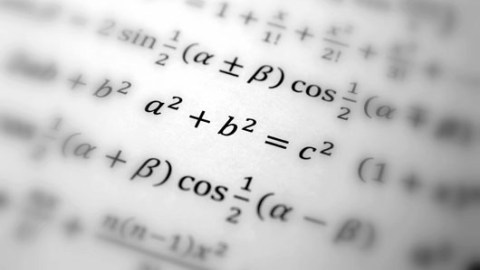Roll Over, Pythagoras: the “Holy Grail” of Math May Have Been Found

What’s the Big Idea?
The so-called “holy grail” of mathematics may have just been found. Shinichi Mochizuki, a professor at the Research Institute for Mathematical Sciences at Kyoto University, released a 500-page proof of the abc conjecture in number theory which involves the relationship between prime numbers, which I will attempt to describe as succinctly as possible below.
A lot of open theory on prime numbers is based on the abc conjecture. So if verified, Mochizuki’s proof would mean a great leap forward in our understanding of primes. It could also be used to help simplify other complex proofs, such as Fermat’s last theorem.
This is high-level mathematics, which is even inaccessible to many mathematicians. So it is with that caveat that we are providing the following links to you (extremely) intrepid math geeks out there. Here is Mochizuki’s study in four parts:
Mochizuki is a math genius who received his Ph.D from Princeton University at the age of 22 and hasn’t slowed down since.
So what exactly is the abc conjecture?
The clearest explanation I could find of the abc conjecture is this single paragraph from the ABC@home project from the Mathematical Institute of Leiden University:
The ABC conjecture involves abc-triples: positive integers a,b,c such that a+b=c, a rad(abc), the so-called radical of abc.* The ABC conjecture says that there are only finitely many a,b,c such that log(c)/log(rad(abc)) > h for any real h > 1. The ABC conjecture is currently one of the greatest open problems in mathematics. If it is proven to be true, a lot of other open problems can be answered directly from it.
*The rad(abc) is the “product of the unique prime factors of a,b, and c”
What’s the Significance?
Not surprisingly, there are many other descriptions of the abc conjecture that are completely unwieldy. So to put it as succinctly as possible, here’s what Mochizuki had to solve: the conjecture states there is a finite group of triples with the properties described above. Since numbers go up toward infinity, one could find examples of these triples here and there until the end of time. Instead, what Mochizuki was able to establish was a logical reason for this pattern. In other words, he was able to identify exactly why these groups of numbers have always been considered special. If Mochizuki’s work is verified, we will be able to finally prove a great deal of theorems largely built upon the abc conjecture in the field of number theory in ways that go even further over my head.
That is why Philip Ball in the journal Naturecalls this an “astounding achievement” in the field of Mathematics, perhaps the most significant achievement so far in the 21st century.
Also worth reading is Ivars Peterson’s MathTrek blog, from 1997, in which Peterson surveyed other mathematicians on the then-unsolved conjecture’s significance. Here’s Andrew J. Granville of the University of Georgia in Athens: “This strange conjecture turns out to be equivalent to all the main problems. It’s at the center of everything that’s been going on.”
Peterson also quotes Dorian Goldfeld, who describes the conjecture as a true game-changer in a Math Horizons article:
It is more than utilitarian; to mathematicians it is also a thing of beauty. Seeing so many Diophantine problems unexpectedly encapsulated into a single equation drives home the feeling that all the subdisciplines of mathematics are aspects of a single underlying unity, and that at its heart lie pure language and simple expressibility.
Image courtesy of Shutterstock
Follow Daniel Honan on Twitter @Daniel Honan




